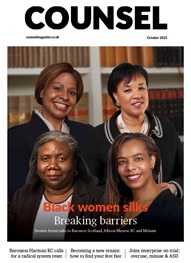*/
The Bar Council has reacted with interest to Lord Justice Jackson’s provisional view on “no win no fee” agreements contained in his preliminary report in his Review of Civil Litigation Costs.
In the report, published on 8 May, Jackson LJ states: “following the retraction of legal aid, either conditional fee agreements (CFAs) or some other system of payment by results (contingent fee agreements, CLAF, SLAS, third party funding agreements etc) must exist in order to facilitate access to justice.” “The real issue … is how CFAs or alternative ‘no win – no fee’ arrangements should be structured, not whether they should exist,” he continues.
Welcoming the report, the Bar Chairman, Desmond Browne QC, said: “Public funding for civil cases is now unavailable in many areas. Very careful consideration therefore needs to be given to the means whereby meritorious litigants are assured of the access to justice which they deserve.”
Michael Todd QC, Chair of the Bar Council Jackson Working Group, said: “I note that Lord Justice Jackson has focused on questions relating to cost shifting, fixed costs, personal injury claims, controlling the costs of ‘heavy’ litigation, CFAs and ATE insurance, and alternative methods of funding access to civil justice. We are concerned that the ever-increasing costs burden of civil litigation results in a denial of access to justice for the many people who cannot afford those costs. That is clearly not in the public interest.”
In the report, published on 8 May, Jackson LJ states: “following the retraction of legal aid, either conditional fee agreements (CFAs) or some other system of payment by results (contingent fee agreements, CLAF, SLAS, third party funding agreements etc) must exist in order to facilitate access to justice.” “The real issue … is how CFAs or alternative ‘no win – no fee’ arrangements should be structured, not whether they should exist,” he continues.
Welcoming the report, the Bar Chairman, Desmond Browne QC, said: “Public funding for civil cases is now unavailable in many areas. Very careful consideration therefore needs to be given to the means whereby meritorious litigants are assured of the access to justice which they deserve.”
Michael Todd QC, Chair of the Bar Council Jackson Working Group, said: “I note that Lord Justice Jackson has focused on questions relating to cost shifting, fixed costs, personal injury claims, controlling the costs of ‘heavy’ litigation, CFAs and ATE insurance, and alternative methods of funding access to civil justice. We are concerned that the ever-increasing costs burden of civil litigation results in a denial of access to justice for the many people who cannot afford those costs. That is clearly not in the public interest.”
The Bar Council has reacted with interest to Lord Justice Jackson’s provisional view on “no win no fee” agreements contained in his preliminary report in his Review of Civil Litigation Costs.


Justice system requires urgent attention and next steps on the Harman Review
Q&A with Tim Lynch of Jordan Lynch Private Finance
By Marie Law, Director of Toxicology at AlphaBiolabs
By Louise Crush of Westgate Wealth Management
Why Virtual Assistants Can Meet the Legal Profession’s Exacting Standards
Six months of court observation at the Old Bailey: APPEAL’s Dr Nisha Waller and Tehreem Sultan report their findings on prosecution practices under joint enterprise
The Amazonian artist’s first international solo exhibition is wholly relevant to current issues in social and environmental justice, says Stephen Cragg KC
Despite its prevalence, autism spectrum disorder remains poorly understood in the criminal justice system. Does Alex Henry’s joint enterprise conviction expose the need to audit prisons? asks Dr Felicity Gerry KC
Until reforms are instituted and a programme of training is introduced, expert opinion on intimate partner abuse remains vital to realigning the tilted scales of law and justice, writes Professor Susan Edwards
It’s been five years since the groundbreaking QC competition in which six Black women barristers, including the 2025 Chair of the Bar, took silk. Yet today, the number of Black KCs remains ‘critically low’. Desirée Artesi talks to Baroness Scotland KC, Allison Munroe KC and Melanie Simpson KC about the critical success factors, barriers and ideas for embedding change